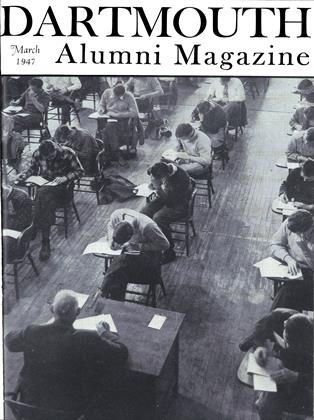ByRichard E. Lauterbach '35. Harper & Bros.,1947, pp. 239, $2.75.
This book is an unpretentious story of the author's journey last summer, across Siberia, from Vladivostock to Moscow. It is not quite as broad in scope as his previous account of wartime Russia (These Are the Russians, 1945)
During the long and wearisome voyage, Lauterbach chats, in halting Russian, with the various Russians he meets—peasants, veterans, diplomats—reads editorials in local papers (mostly uncomplimentary to the U. S.), compares Siberia to the American West, takes pictures with his camera (many appear in the book). What emerges is a drab, war-weary country, proud of its war achievements, but uncertain of its future and suspicious of its former allies. What worries the average Russian? Almost everyone Lauterbach met spoke with bitterness about Churchhill's Fulton speech and the atom bomb policy; some resented the policies of the British in Greece and the Americans in China and the U. S. insistence on permanent military bases. Apparently, all these things spell for Russians "capitalistic encirclement," or what the Soviet historian Tarle called "pax Americana" (a translation of his article on the subject appears in the Appendix).
One must be grateful to Mr. Lauterbach for clarifying the Russian viewpoint on recent world events; it is important for Americans to gauge this. The author is also to be complimented for gathering some pertinent data which strengthens the view of the Soviet Union's internal weakness, her inability (militarily and economically) to wage a major war in the near future. On the whole, this diagnosis of postwar Russia is confirmed by a score of competent observers of the Soviet scene. The author's prognosis, however, seems less convincing. Mr. Lauterbach is upset by the deterioration of Soviet-American friendship since Yalta; he believes that this condition can be remedied only by greater concessions to the Soviet point of view—all along the line—from atomic control to the present U. S. policies in China and Europe. Such a course seems, to this reviewer, Utopian and not likely to bring about the desired results.
 View Full Issue
View Full Issue
More From This Issue
-
 Article
Article"Free as the Air"
March 1947 By JERRY A. DANZIG '34, -
 Class Notes
Class Notes1918
March 1947 By ERNEST H. EARLEY, DONALD L. BARR -
 Article
ArticleRadio Interprets the News
March 1947 By CEDRIC FOSTER '24, -
 Class Notes
Class Notes1937
March 1947 By JOHN H. DEVLIN, ARTHUR H. RUGGLES JR. -
 Article
ArticlePHYSICS FOR THE FUTURE
March 1947 By PROF. ARTHUR B. MESERVEY '06. -
 Class Notes
Class Notes1921
March 1947 By DONALD G. MIX, ROBERT M. MACDONALD
Books
-
 Books
BooksSEX IN MARRIAGE
FEBRUARY 1932 By Frederic P. Lord -
 Books
BooksCOLLEGE CHEMISTRY.
November 1956 By HENRY H. BAKER, JR. '29 -
 Books
BooksA Troubling Read
MAY 1978 By MICHAEL DORRIS -
 Books
BooksADVENTURES IN WORLD LITERATURE.
June 1937 By Stearns Morse -
 Books
BooksMETHOD AND THEORY IN EXPERIMENTAL PSYCHOLOGY.
January 1954 By THEODORE KARWOSKI -
 Books
BooksTHE ROAD TO RENO.
June 1962 By W. R. WATERMAN

